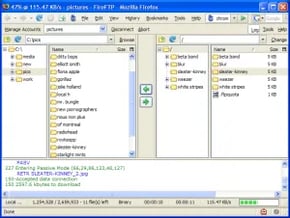 First proposed in its basic form more than 40 years ago, File Transfer Protocol (FTP) is an archaic networking technology which should have been ditched long ago.
First proposed in its basic form more than 40 years ago, File Transfer Protocol (FTP) is an archaic networking technology which should have been ditched long ago.
Remarkably, though, it’s still useful in some areas -- when accessing your own web server, maybe -- and as a result there’s still a strong demand for FTP & SFTP clients. Normally this might involve installing something like FileZilla; it’s fast, reliable, packed with features, and a great choice for heavy-duty FTP users.
But if you’re looking for something simpler, Firefox add-on FireFTP could be a very good choice.
Launch it from the Tools > Web Developer menu (you can add it to your toolbar if you prefer) and FireFTP displays a very familiar FTP client-type interface; local file browser on the left, remote server on the right, status pane below, and "account creation" tools to save the details of your favorite sites. (Good news if you’re a FileZilla user: FireFTP can import your existing stored sites in a few seconds.)
Once you’ve connected, files can be transferred between local and remote folders by browsing to them and dragging and dropping.
There are built-in sync tools to compare and synchronize individual folders, or entire local and remote folder trees.
Despite "only" being a browser add-on, FireFTP also has all the other essentials you’d expect from an FTP client. There’s automatic resume for broken transfers, full SSL/TLS/SFTP support, CHMOD and full file properties, remote editing, FXP and more.
This is all very easy to use, but if you’re an FTP newcomer -- or just run into some odd problem or bug -- then you might still have questions occasionally. Fortunately, the developer understands this, and the FireFTP site has a lot of detailed help available.
The program still can’t compete with FileZilla or other high-end FTP clients, of course, but FireFTP is more than powerful enough for many applications. If your FTP needs are straightforward, go take a look.

 First proposed in its basic form more than 40 years ago, File Transfer Protocol (FTP) is an archaic networking technology which should have been ditched long ago.
First proposed in its basic form more than 40 years ago, File Transfer Protocol (FTP) is an archaic networking technology which should have been ditched long ago.